
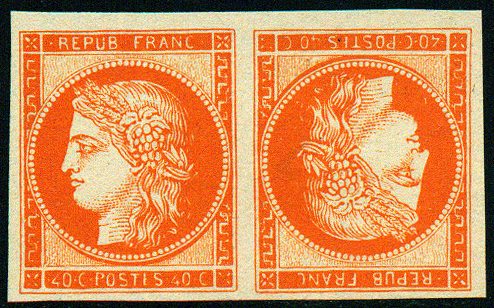

(Peter Winter tete-beche forgeries)
Return To Catalogue - France Ceres type, forgeries, part 1 - France Ceres type, forgeries, part 3, Fournier - France Ceres type (1849-1875), Sperati forgeries - Ceres type stamps - France overview
Note: on my website many of the
pictures can not be seen! They are of course present in the cd's;
contact me if you want to purchase them: evert@klaseboer.com.
For more forgeries of the France Ceres type, click here, or here for Sperati forgeries.
The tete-beche stamps have also been forged, for example the forger Fournier is known to have made forgeries.
I've also seen a pair of genuine 20 c stamps, where in one of the stamps, the head of Ceres and the inscriptions had been cut out and pasted upside down, in order to pretent to be a rare tete-beche variety.
I have also seen a Peter Winter tete-beche forgery of the 10c red(!), 15 c orange!), 40 c orange and 40 c red(!):



(Peter Winter tete-beche forgeries)


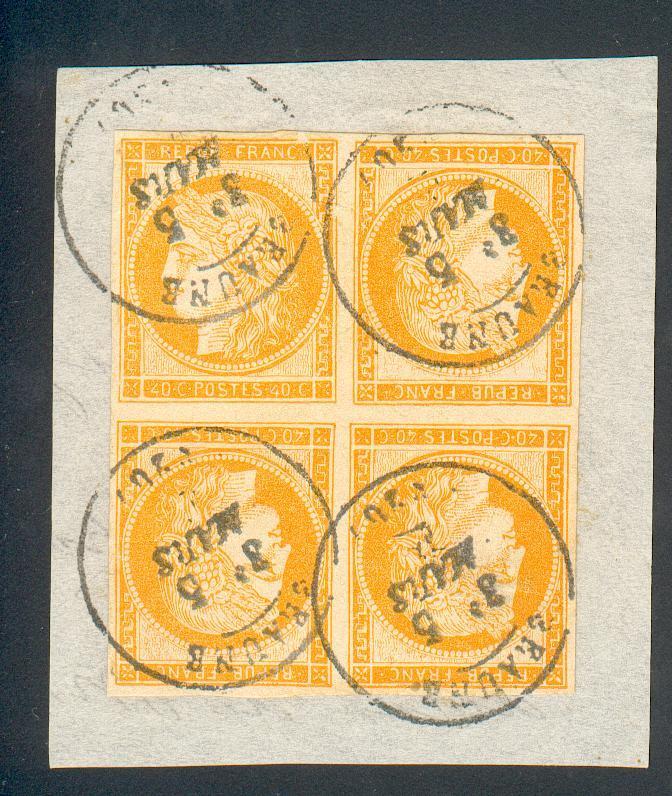
(Other Winter products block of 4 stamps with one inverted stamp,
note the 'BEAUNE 3e 5 MARS (26)' cancel which seems to have been
used often by Winter). I've seen several forged 15 c green Ceres
stamps with the same cancel (also in a pair of two stamps).
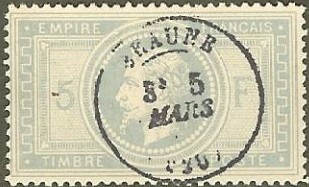
A 5 F Napoleon stamp with exactly the same cancel of Beaune
Winter also sold his forgeries normally:

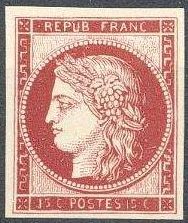
(A 10 c orange (!) and a 15 c red(!) Winter forgery, I have also
seen a 10 c red)
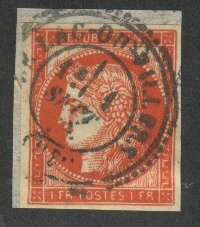
This forgery has the cancel 'LE LAC-OR.....', (the rest becomes
very blotchy and I cannot deceipher it), I have also seen a bloc
of four forgeries, where 1 stamp was printed tete-beche with
exactly the same cancel.
This forgery was also made by Peter Winter (for more information see: http://www.sheryll.net/Forgeries/Ugly_Sellers/Forgeries_article_Ugly_Sellers.htm). The same 'LE LAC-OR...' cancel can be found on one of his 5 F Napoleon issue forgeries.
Other tete-beche forgery:
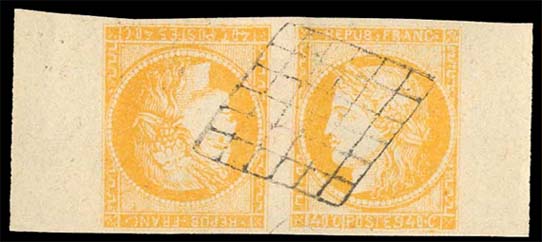
(Other tete-beche forgery)

Mini sheet made in 1938 with a 20 c black reprint for the 'FOIRE
de LYON'; the stamp is cancelled 'LYON 1 JANV 49 (68)'
Another 'reprint' of the 20 c black was made for the 'Salon der Philatelie' in Hamburg (Germany) in 1984. The stamp is 1.25 times too large (the inscription on the back reads 'Ma▀stab 1: 1,25'. It is printed singly on a minisheet with a wavy 'watermark' and with 'Reproduktion 1984' printed at the bottom of the stamp.
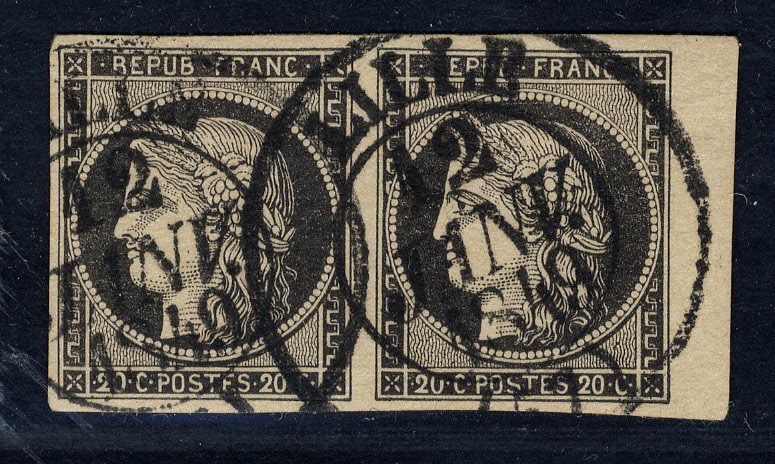
I've often seen the above pair of 20 c forgeries with cancel
'LILLE 12 JANV. 1849' (always in the same position). I've also
seen single stamps cut from the above pair. These are modern
forgeries.
Two different kinds of postal forgeries are known to have been used in Marseilles. Used postal forgeries always have the cancel '2240' of Marseilles.
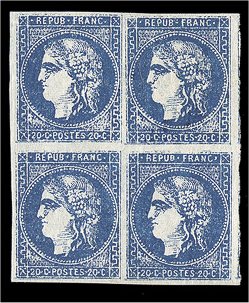
Reduced sizes, 'Marseille' forgery
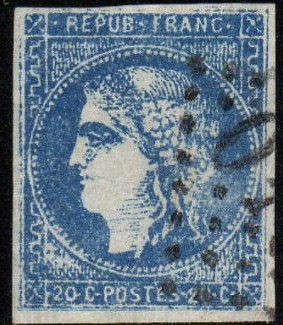
Marseilles forgery, 'FAUX DE PONS'
The first postal forgery of Marseilles is also known as 'FAUX DE PONS'. This forgery is also very poorly executed. There is a white area in the hair above the grapes, there are irregular points below the eyes. A white dot in front of the left '20' touches the line in front of it. A white line extends to the interior of the left 'C' behind '20'. The rigth '2' is slanting slightly backwards.
I don't posess an image of the second postal forgery of Marseille.
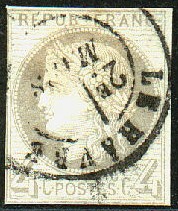
The above stamp has the perforations cut off, to make it seem a french colonies issue or a Bordeaux issue. However, the cancel 'Le Havre' proves that this is not a french colony issue. The Bordeaux issue differs in many aspects from the perforated stamps. So the stamp is just a forgery!
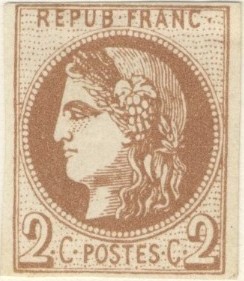
This 2 c stamp differs in design in several aspects from a
genuine 2 c stamp.
The above forgeries are overprinted 'B.BALLON P.E.'; could this be an attempt to imitate a rare cancel (are these Spiro forgeries?)?
The following picture of a piece of an envelope was send to me by Christophe Veysseyre. It has a 'BALLON MONTE' mark, a 'PARIS 5E/29 SEPT 70 R. DE PALESTRO' cancel, a '16' star cancel and looks very convincing at first sight. However, there is a 20 c brown stamp on it that was never issued. The two stamps are forged, compare for example the pearls in the central circle with a genuine stamp (the pearls in this forgery are too small). Also the perforation is very rough. Even the envelope is forged; see the almost identical envelope below with similar stamps on it. Note that the text at the back (which can be vaguely seen shining through), is identical to the one on the piece of the envelope. I've been told that these facsimiles were produced by Letts (the diary producers) and sold for 6 p.
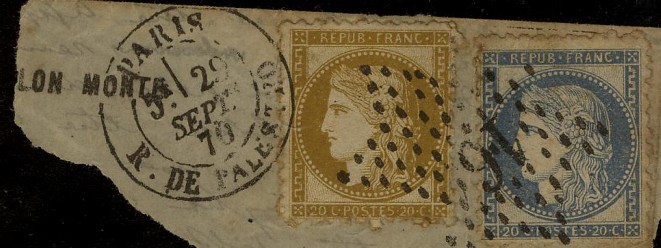

Similar item obtained from a Cavendish auction adressed to 'Mr.
Simpson Hereford Square London S.W.' I've been told that these
envelopes by Letts, a dairy producer and sold for 6 pence.
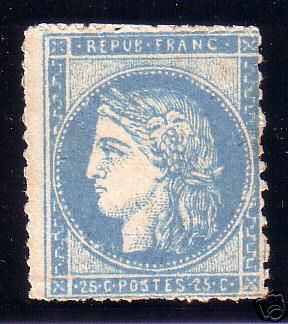
I've been told that this is a postal forgery made in Oran
(Algeria; "Faux d'Oran") of the 25 c blue. The upper
left ornamental greec border starts from the left in this forgery
(in the genuine it starts from the right). The perforation is
very badly done.
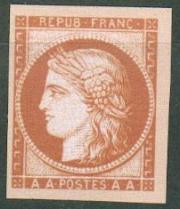
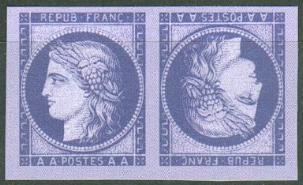
I have seen many 'stamps' with 'AA POSTES AA' in the design
resembling the 1849 issue of France, I have seen many colours,
also blocks with tete-beche stamps; I don't know where these
so-called 'vignettes' come from